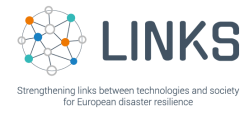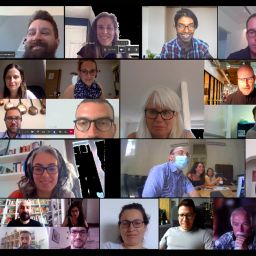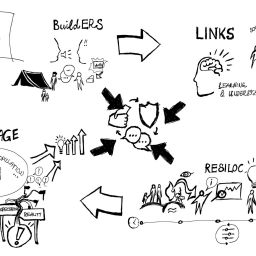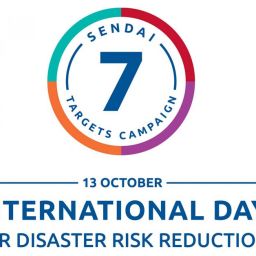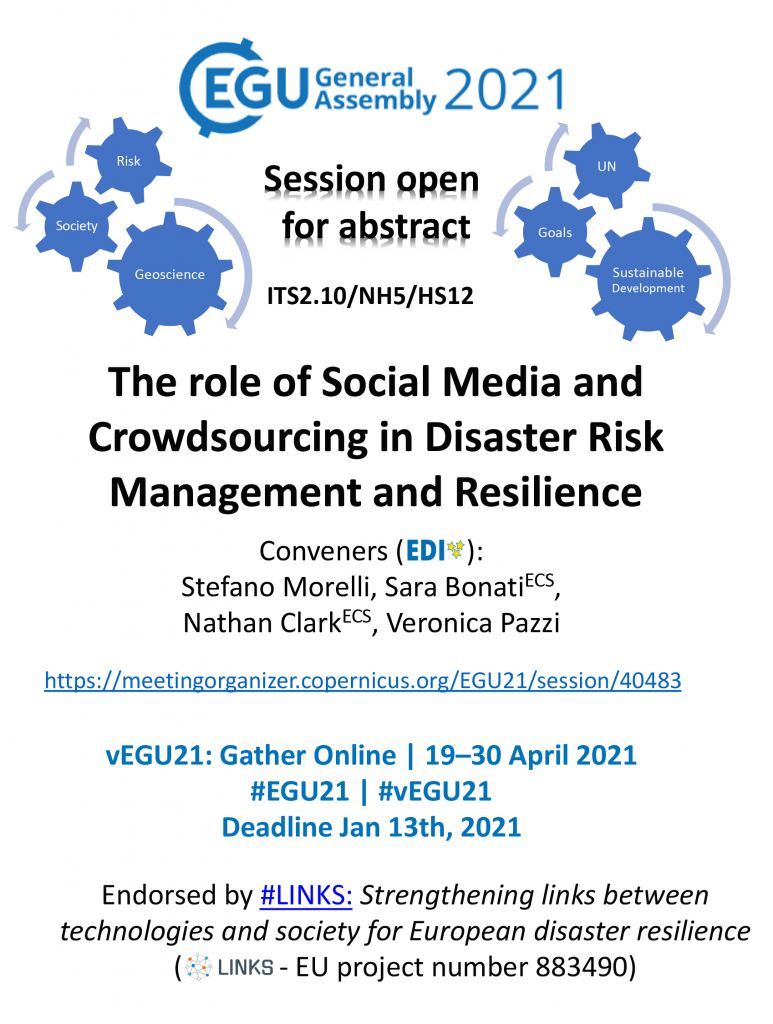
We are pleased to invite you to present your work at the next vEGU21: Gather Online (19–30 April 2021) that will be held entirely online.
We would like to draw your attention concerning our session ITS2.10/NH5 (EDI), entitled:
The role of Social Media and Crowdsourcing in Disaster Risk Management and Resilience
Session Conveners:
Stefano Morelli,
Sara BonatiECS,
Nathan ClarkECS,
Veronica Pazzi
Session description:
Natural or man-made hazards pose a risk to many parts of the world, at times causing damages to the people, property, and the environment with economic, social, and environmental consequences. In recent years, social media and crowdsourcing (SMCS) have been integrated into crisis and Disaster Risk Management (DRM) for improved information gathering and collaboration across communities. Numerous governments and EU-funded projects have been supporting the implementation and use of SMCS by developing and adopting new technologies, procedures, and applications for gathering and sharing information within communities, and for collaboratively coping with critical situations. The effectiveness of SMCS on European disaster resilience, however, remains unclear, due to the diversity among disaster risk perception and vulnerability.
This session looks for works that aim to create new approaches, in a coordinated and coherent effort between geoscience and social, economic, and political sciences, that would not be possible if handled separately. Therefore, it is planned to collect contributions about, but it is not limited to: a) disaster risk perception, awareness, and vulnerability in relation to SMCS, with a focus on accessibility to technologies and social marginalization; b) the use of SMCS in disaster crisis management as a way to improve Disaster Risk Reduction (DRR) and to enhance social resilience; c) the dynamic role of SMCS in situational awareness (states, systems, and processes) as part of the disaster management processes. In general, research relating to scientific methods, practical tools, protocols, and guidelines addressing ways to govern and understand the effectiveness of SMCS for Disaster Risk Management and Disaster Resilience are welcomed.
This section is supported and endorsed by the European Project LINKS: Strengthening links between technologies and society for European disaster resilience (Call: H2020-SU-SEC-2018-2019-2020 (Security), Topic: SU-DRS01-2018-2019-2020, Type of action: RIA, project number 883490).
https://meetingorganizer.copernicus.org/EGU21/session/40483
The official deadline for abstract submission is January 13, 2021, 13:00 CET.
The conveners are considering the publication of a special issue in one of the thematic journals (https://www.egu.eu/publications/open-access-journals/) with the works of the session.
—
Further information about abstract submission
An Abstract processing charge of €40 gross must be paid for each abstract submission. For late abstracts a higher APC of €80 gross will be invoiced.
All first authors of abstracts submitted to the General Assembly 2021 haveto be 2021 EGU members. The membership can be acquired upon abstract submission.
Guidelines for abstract submission can be found at:
https://egu21.eu/abstracts_and_programme/how_to_submit_an_abstract.html#guidelines
Please note that participation to vEGU21 will be allowed after the payment of a registration fee.
The registration fees are waived for (a) scientists receiving an EGU award or medal, (b) scientists with a permanent affiliation in a low- or lower-middle income country according to the World Bank definition, (c) PhD candidates from all middle income countries according to the World Bank definition, (d) 2021EGU emeritus members, and (e) undergraduate or master students.
Full information about the EGU2021: https://egu21.eu/about/general_information.html
